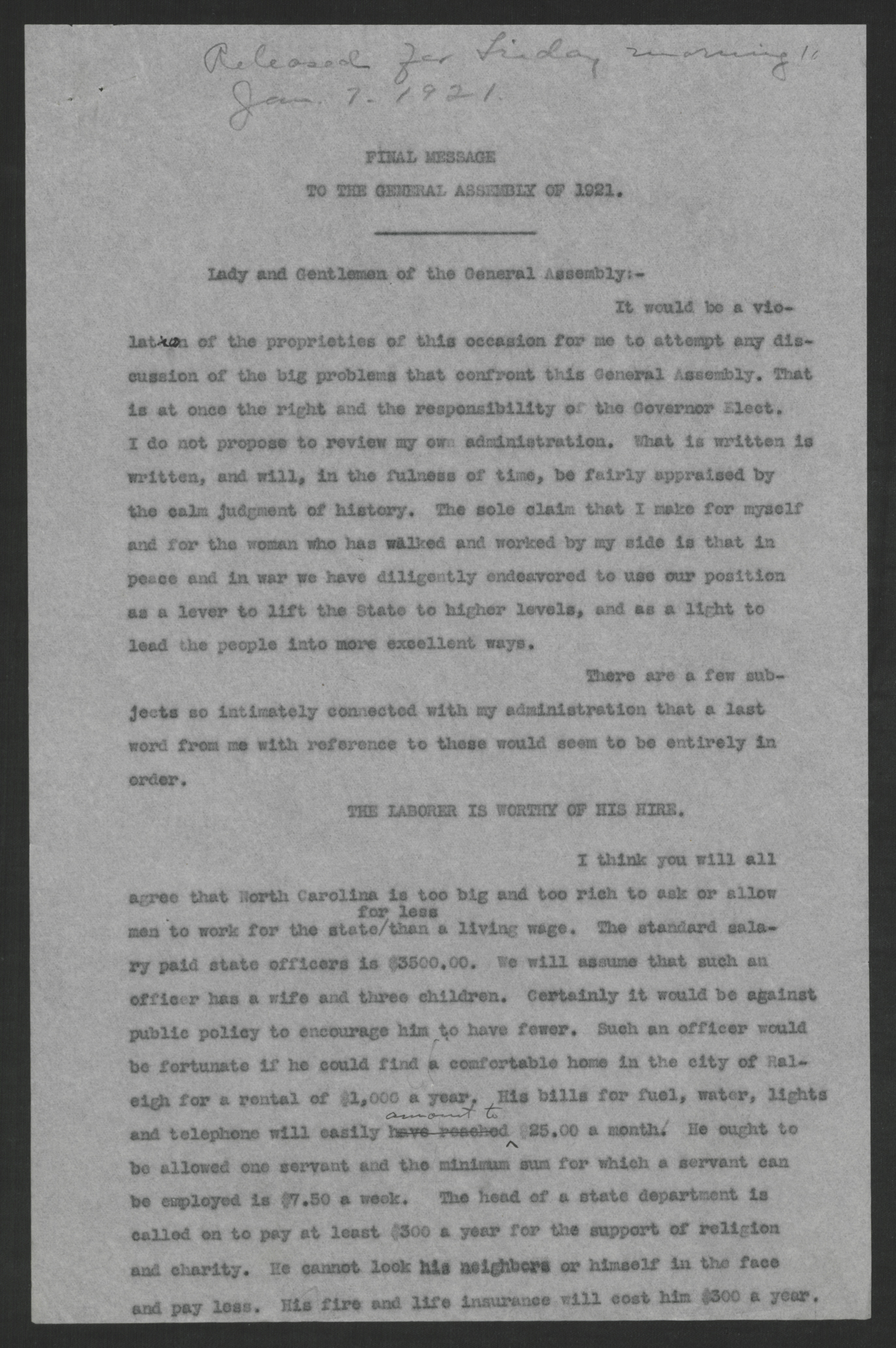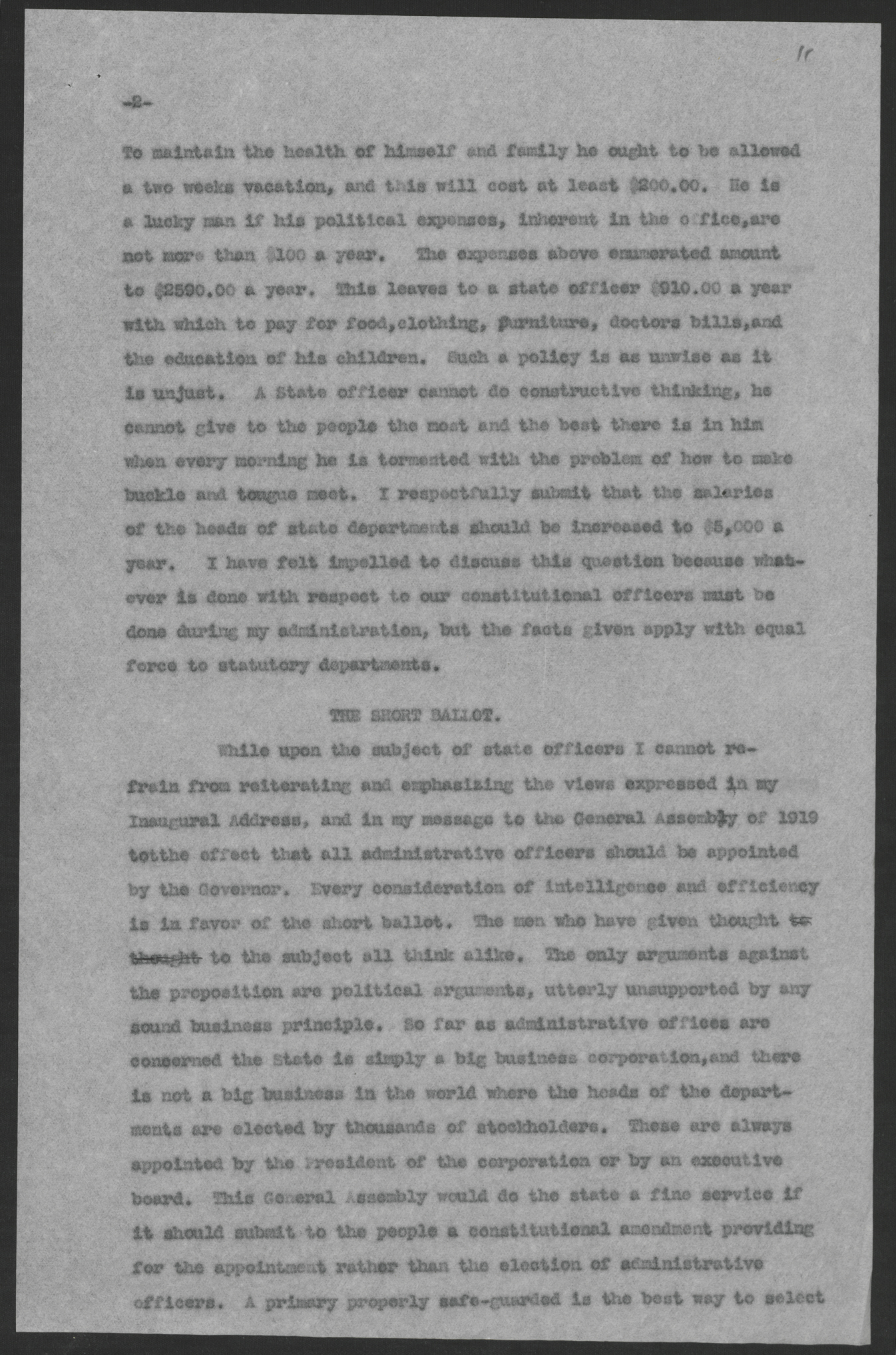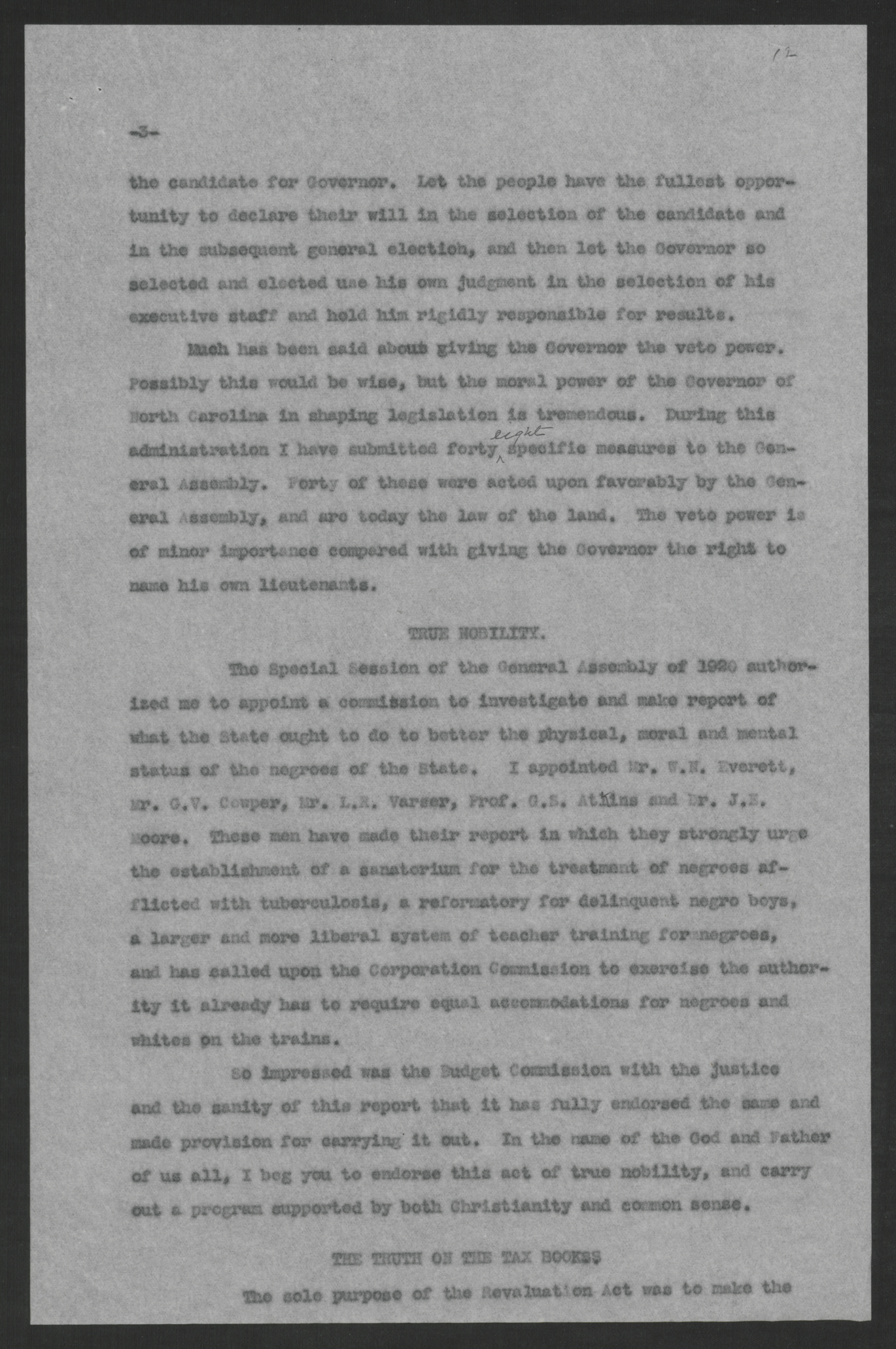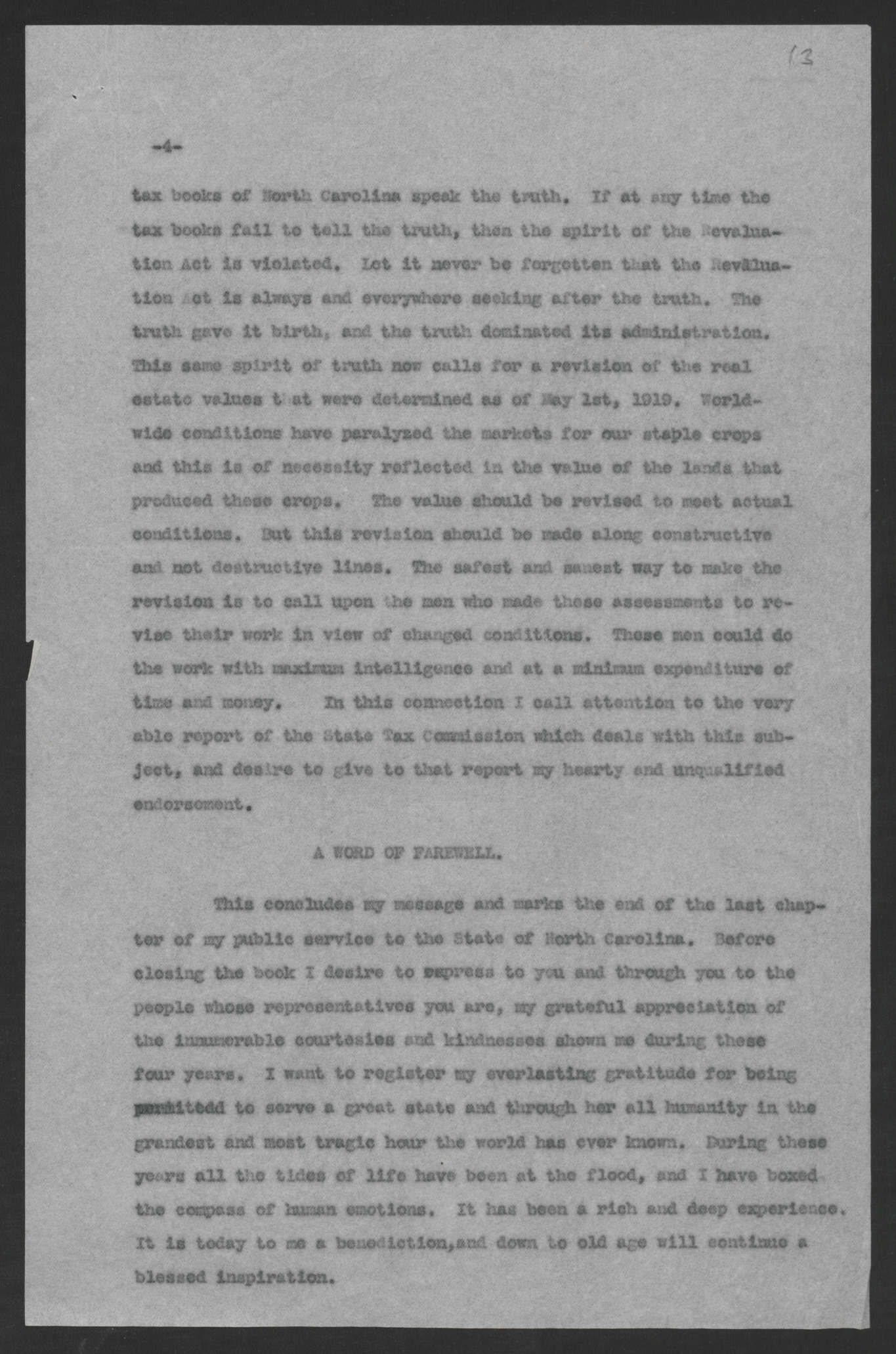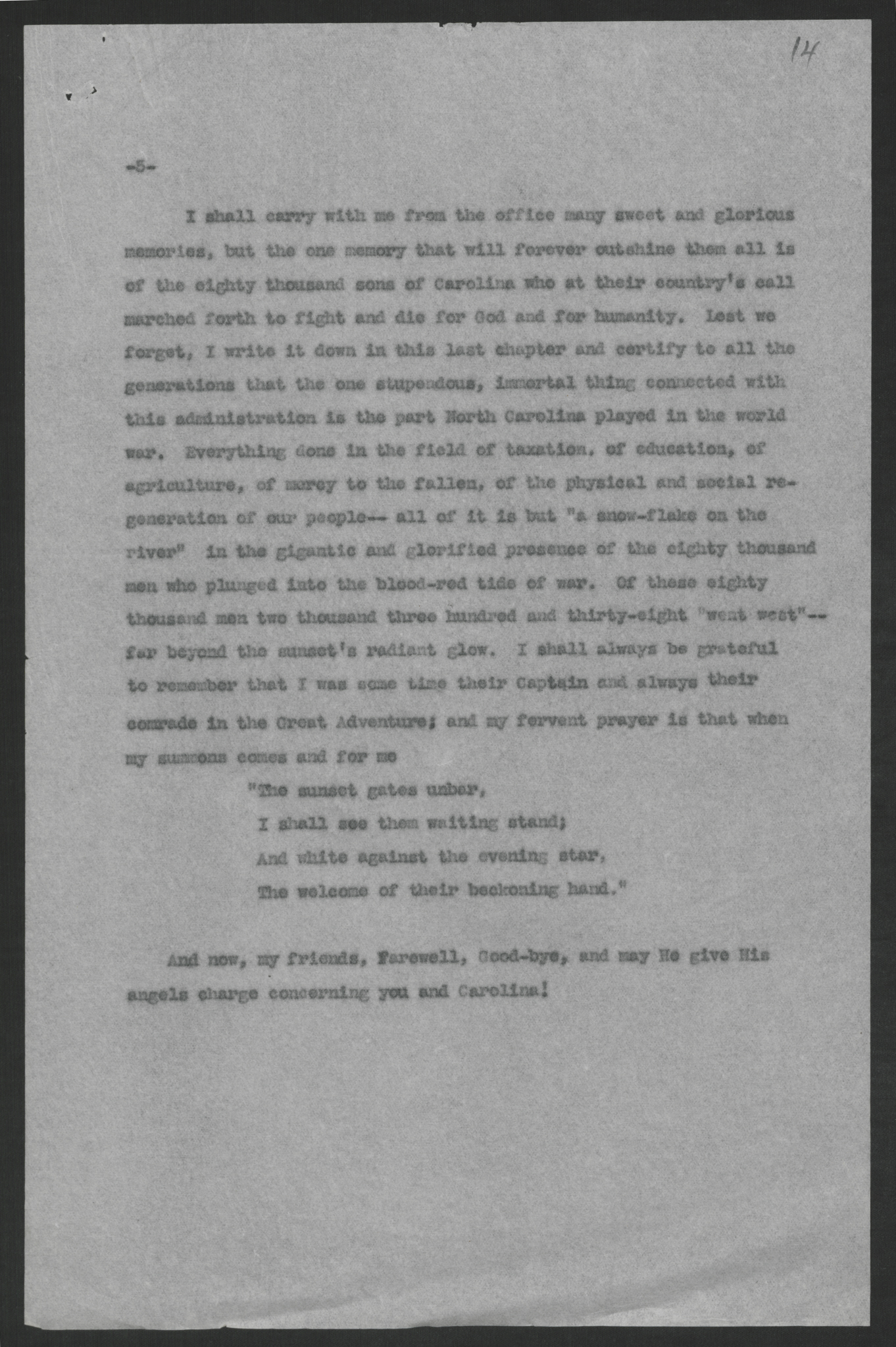<Released for Friday morning Jan. 7. 1921.>
FINAL MESSAGE
TO THE GENERAL ASSEMBLY OF 1921.
Lady and Gentlemen of the General Assembly:-
It would be a violation of the proprieties of this occasion for me to attempt any discussion of the big problems that confront this General Assembly. That is at once the right and the responsibility of the Governor Elect. I do not propose to review my own administration. What is written is written, and will, in the fullness of time, be fairly appraised by the calm judgment of history. The sole claim that I make for myself and for the woman who has walked and worked by my side is that in peace and in war we have diligently endeavored to use our position as a lever to lift the State to higher levels, and as a light to lead the people into more excellent ways.
There are a few subjects so intimately connected with my administration that a last word from me with reference to these would seem to be entirely in order.
THE LABORER IS WORTHY OF HIS HIRE.
I think you will all agree that North Carolina is too big and too rich to ask or allow men to work for the state for less than a living wage. The standard salary paid state officers is $3,500. We will assume that such an officer has a wife and three children. Certainly it would be against public policy to encourage him to have fewer. Such an officer would be fortunate if he could find a comfortable home in the city of Raleigh for a rental of $1,000 a year. His bills for fuel, water, lights and telephone will easily amount to $25 a month. He ought to be allowed one servant and the minimum sum for which a servant can be employed is $7.50 a week. The head of a state department is called on to pay at least $300 a year for the support of religion and charity. He cannot look his neighbors or himself in the face and pay less. His fire and life insurance will cost him $300 a year. To maintain the health of himself and family he ought to be allowed a two weeks vacation, and this will cost at least $200. He is a lucky man if his political expenses, inherent in the office, are not more than $100 a year. The expenses above enumerated amount to $2,590. This leaves to a state officer $910 a year with which to pay for food, clothing, furniture, doctors bills, and the education of his children. Such a policy is as unwise as it is unjust. A State officer cannot do constructive thinking, he cannot give to the people the most and the best there is in him when every morning he is tormented with the problem of how to make buckle and tongue meet. I respectfully submit that the salaries of the heads of state departments should be increased to $5,000 a year. I have felt impelled to discuss this question because whatever is done with respect to our constitutional officers must be done during my administration, but the facts given apply with equal force to statutory departments.
THE SHORT BALLOT.
While upon the subject of state officers I cannot refrain from reiterating and emphasizing the views expressed in my Inaugural Address, and in my message to the General Assembly of 1919 to the effect that all administrative officers should be appointed by the Governor. Every consideration of intelligence and efficiency is in favor of the short ballot. The men who have given thought to the subject all think alike. The only arguments against the proposition are political arguments, utterly unsupported by any sound business principle. So far as administrative offices are concerned the State is simply a big business corporation, and there is not a big business in the world where the heads of the departments are elected by thousands of stockholders. These are always appointed by the President of the corporation or by an executive board. This General Assembly would do the State a fine service if it should submit to the people a constitutional amendment providing for the appointment rather than the election of administrative officers. A primary properly safe-guarded is the best way to select the candidate for Governor. Let the people have the fullest opportunity to declare their will in the selection of the candidate and in the subsequent general election, and then let the Governor so selected and elected use his own judgment in the selection of his executive staff and hold him rigidly responsible for results.
Much has been said about giving the Governor the veto power. Possibly this would be wise, but the moral power of the Governor of North Carolina in shaping legislation is tremendous. During this administration I have submitted forty eight specific measures to the General Assembly. Forty of these were acted upon favorably by the General Assembly, and are today the law of the land. The veto power is of minor importance compared with giving the Governor the right to name his own lieutenants.
TRUE NOBILITY.
The Special Session of the General Assembly of 1920 authorized me to appoint a commission to investigate and make report of what the State ought to do to better the physical, moral and mental status of the negroes of the State. I appointed Mr. W. N. Everett, Mr. G. V. Cowper, Mr. L. R. Varser, Prof. G. S. Atkins, and Dr. J. E. Moore. These men have made their report in which they strongly urge the establishment of a sanatorium for the treatment of negroes afflicted with tuberculosis, a reformatory for delinquent negro boys, a larger and more liberal system of teacher training for negroes, and has called upon the Corporation Commission to exercise the authority it already has to require equal accommodations for negroes and whites on the trains.
So impressed was the Budget Commission with the justice and the sanity of this report that it has fully endorsed the same and made provision for carrying it out. In the name of the God and Father of us all, I beg you to endorse this act of true nobility, and carry out a program supported by both Christianity and common sense.
THE TRUTH ON THE TAX BOOKS.
The sole purpose of the Revaluation Act was to make the tax books of North Carolina speak the truth. If at any time the tax books fail to tell the truth, then the spirit of the Revaluation Act is violated. Let it never be forgotten that the Revaluation Act is always and everywhere seeking after the truth. The truth gave it birth, and the truth dominated its administration. This same spirit of truth now calls for a revision of the real estate values that were determined as of May 1st, 1919. Worldwide conditions have paralyzed the markets for our staple crops and this is of necessity reflected in the value of the lands that produced these crops. The value should be revised to meet actual conditions. But this revision should be made along constructive and not destructive lines. The safest and sanest way to make the revision is to call upon the men who made these assessments to revise their work in view of changed conditions. These men could do the work with maximum intelligence and at a minimum expenditure of time and money. In this connection I call attention to the very able report of the State Tax Commission which deals with this subject, and desire to give to that report my hearty and unqualified endorsement.
A WORD OF FAREWELL.
This concludes my message and marks the end of the last chapter of my public service to the State of North Carolina. Before closing the book I desire to express to you and through you to the people whose representatives you are, my grateful appreciation of the innumerable courtesies and kindnesses shown me during these four years. I want to register my everlasting gratitude for being permitted to serve a great state and through her all humanity in the grandest and most tragic hour the world has ever known. During these years all the tides of life have been at the flood, and I have boxed the compass of human emotions. It has been a rich and deep experience. It is today to me a benediction, and down to old age will continue a blessed inspiration.
I shall carry with me from the office many sweet and glorious memories, but the one memory that will forever outshine them all is of the eighty thousand sons of Carolina who at their country's call marched forth to fight and die for God and for humanity. Lest we forget, I write it down in this last chapter and certify to all the generations that the one stupendous, immortal thing connected with this administration is the part North Carolina played in the world war. Everything done in the field of taxation, of education, of agriculture, of mercy to the fallen, of the physical and social regeneration of our people-- all of it is but "a snow-flake on the river" in the gigantic and glorified presence of the eighty thousand men who plunged into the blood-red tide of war. Of these eighty thousand men two thousand three hundred and thirty-eight "went west"-- far beyond the sunset's radiant glow. I shall always be grateful to remember that I was sometime their captain and always their comrade in the Great Adventure; and my fervent prayer is that when my summons comes and for me
"The sunset gates unbar,
I shall see them waiting stand;
And white against the evening star,
The welcome of their beckoning hand."
And now, my friends, farewell, Good-bye, and may He give His angels charge concerning you and Carolina!
Date:
Sender:
Recipient:
Related People:
Repository:
Collection:
Places:
»» »» North Carolina

